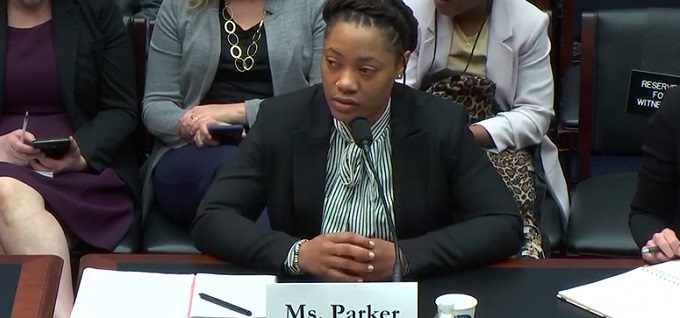Try and try and try again
By Matthew Dembicki
March 20, 2019
A former community college student testifies about the challenges she faced in her quest for a college education.
During a House hearing last week on college costs, it was the testimony of a community college graduate who summed up the challenges that many two-year college students face, as well as the college services available to help them cross such hurdles.
Sitting on a panel before the House Education and Labor Committee that included researchers, an interim university chancellor and a former White House adviser, it was 29-year-old Jenae Parker — who came with her 8-year-old daughter — that had lawmakers listening intently and even drawing emotional, heartfelt responses from them.
Parker’s story includes many aspects that members of the committee want to address as they look to reauthorize the Higher Education Act, from her own lack of understanding about the total costs of attending college and options to pay for them, to the counseling and wraparound services provided at Columbus State Community College (Ohio) and other local providers that buoyed her to earn her associate degree.
The hearing was the first of five planned by the committee that are related to HEA reauthorization.
Life happens
Parker started and stopped college twice before her third attempt finally led to a degree from Columbus State. In 2008, she started at the University of Toledo as first-generation student coming from a single-parent home. She wasn’t prepared for the expenses. Even with a $4,300 Pell Grant and working three jobs, she had to borrow more than $20,000 in private and public loans in her first year. Exhausted, she dropped after two years.
Five years later, she tried again. She now had a daughter and was recently divorced. She worked full-time and enrolled in Columbus State because it was less expensive. But again, life became too much of a challenge. In addition to her daughter, she also was tending to her ill mother, and upon her passing had to care for her two teenage brothers. Again, she dropped out.
Four years later, Parker tried again by re-enrolling at Columbus State, this time as a part-time student. Again, she worked three jobs — at CVS, the postal service and a third-shift cleaning job — and earned an associate degree this December. She has now transferred to Franklin University where she is pursuing a bachelor’s degree in human resources.
Unaware of total costs
Several committee members noted that many college students lack financial literacy, which can get them into debt fast. Too often, students — especially first-generation students and those from low-income families — focus on the tuition and don’t look at related expenses, speakers at the hearing noted.
“Students are shockingly uninformed about their own financial circumstances,” said Elizabeth Ackers, a senior fellow at Manhattan Institute in New York City. Only about half of first-year college students know how much they are paying for their degree, and about one-third of students know how much they’ve borrowed, she said.
That was the case with Parker. She had to account for costs such as books and supplies, transportation, food, housing, child care and other expenses. She currently has about $66,000 in college debt.
“So many people think community college is already free, especially for people like me who get a Pell Grant,” Parker said.
Services and resources
In Parker’s case, Columbus State did have resources to help. The college helped her secure subsidized child care and provided assistance in completing an application for federal SNAP benefits. A staffer also helped Parker sign up for medical insurance and directed her to scholarships. In addition, she was also referred to the Columbus Scholar House, which provides housing for lower income college students with children.
“It takes a platform — all of these put together — for me to be able to get to completion,” Parker said.
Another benefit: Columbus State has a partnership with Franklin University that allows students to transfer up to 94 semester hours from the college. As an employee of Columbus State, Parker also receives a 15 percent discount on tuition to attend Franklin.
There’s more to the story! Read the full article in CC Daily.



